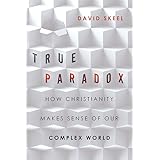
I have read many good words about David Skeel's book "True Paradox: How Christianity Makes Sense of our Complex World." David is on the faculty of the law school of the University of Pennsylvania and is among America's most highly regarded scholars of corporate and bankruptcy law and the intersections between the two. He is also a significant writer when it comes to an even bigger insection, the one between law and religion. I've previously posted about Skeel's work many times and you can read some representative samples here and here.
I haven't read David's new book so I've been reluctant to post anything about it. Recently, however, there was a fine review in First Things, one which is now available for download by going here. The reviewer, Robert T. Miller of the University of Iowa, clearly describes the contours of Skeel's fundamental thesis:
Skeel argues that Christianity is better able than atheistic materialism to explain certain important aspects of human life, including the phenomenon of human consciousness, our appreciation of beauty and its transience, the meaning of human suffering, and our quest for justice.In short, Skeel is arguing neither deductively not inductively but abductively. In other words, Christianity provides the "best fit" for the experiences of self-conscious human life. Others have done this but I'm confident that Skeel does it exceptionally well and with reference to the most recent assertions of the atheistic materialists among us, men (and why does it always seem that males are among the most aggressive of atheists?) such as Richard Dawkins and Steven Pinker.
Unsurprisingly, "True Paradox" is framed in terms of the debate within contemporary elite Western culture, the debate between Christian theism and naturalistic materialism. Skeel does not, at least as I can tell from his reviewers, address approaches to the understanding of self-conscious human life such as Islam and Hinduism. I can't fault him for limiting the scope of his book but I might venture to hope that Skeel or someone addresses whether Christianity's "fit" is better than these other alternatives.




No comments:
Post a Comment